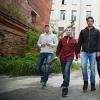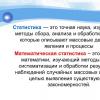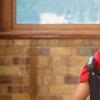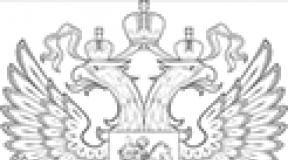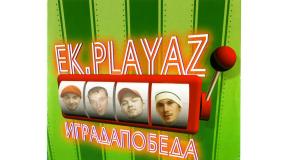Key ideas in modern education. Modern innovations in education. Examples

Education, being one of the main means of developing a person’s personality in social terms, must keep up with the times, i.e. be subject to changes and innovations that meet the needs of society in a given era. But given the instability that characterizes modern pedagogical science in general, it takes time to understand the effectiveness of certain innovations. However, it is no longer possible to adhere to outdated schemes in education today. Taking all this into account, we can only talk about innovation in the field of education in conjunction with traditions.
Traditions and innovations in education
In general, it is impossible to say that the problem of innovation in the field of education is something new, because this question was raised by Jan Amos Comenius, Rudolf Steiner, Lev Semenovich Vygodsky and other prominent figures in the field of philosophy, etc. In other words, we have been talking about transformations in the system of acquiring knowledge and developing skills and abilities for a long time.
If we talk specifically about the modern world, then the very term “innovation”, with regard to education, implies the renewal of the educational system and the introduction of new technologies. And, of course, everything that a person develops for this purpose is aimed mainly at increasing . And this, in turn, tells us that today’s educational standards are outdated, and new approaches need to be developed to educate the new generation. The main reason for the question that it is time to introduce innovations into the education system is the crisis of this very system, and all the innovations being created are aimed at solving its many problems.
And at the moment there are several contradictions in the educational system that require prompt resolution:
- Inconsistency between students’ learning standards, such as interests, abilities, etc.;
- Discrepancy between the pace of development of science and the actual cognitive capabilities of students;
- The discrepancy between the desire for training in one profile and the pedagogical one.
These contradictions cause difficulties in the process of introducing innovations into the educational system. We will briefly talk about them further.
Problems of innovation in education
It is interesting that the problems of innovation in education are already observed at the stage of their development. None of the specialists can give a 100% guarantee that his new pedagogical approach will be successful and will attract like-minded people. Moreover, innovations are always associated with great risk, and there is no certainty that it will be justified.
But despite this, attempts to introduce innovations in the field of education are constantly being made. In addition, experts try to bring all possible innovations into some classification. And one of the most modern classifications of innovation is as follows:
- Essential Innovation– imply the introduction of innovations into the educational system that affect the very essence of education, but which could not be applied previously;
- Retroinnovation– imply the introduction into teaching activities of those approaches that have been forgotten over time;
- Combined Innovations– imply the combination of a certain number of educational methods, as a result of which one new one appears;
- Analog Innovation– imply joining an already known method of teaching a private innovation.
The whole point of innovation in the educational system in general is that attempts are being made to find and successfully apply new approaches to the education of the younger generation. And any innovation must certainly take into account the requirements of modern society and the development of information technology. In addition, innovations should also be applied in four directions:
- Upbringing
- Education
- Control
- Personnel retraining
It is easy to see that the introduction of innovations is a very serious process, associated with a number of theoretical and practical difficulties, as well as a significant amount of risk. However, this should not stop people on their path to improving the educational system, otherwise it may remain mired in irrelevant and outdated educational methods for a long time, which threatens to reduce not only the desire of young people to study in educational institutions, but also the level of their moral, psychological, and ethical , social and cultural development.
And as an example of successful innovations, we would like to cite several so-called “New Schools” of the 20th century, which we can partly focus on even today.
"New schools" of the 20th century
Let us name just a few examples of such schools.
"School for life, through life"
It was opened in Belgium. The process of education and training in this school was based on interaction with living nature, and the emphasis was on the freedom and activity of students, as well as constant interaction with their families. When organizing training, the peculiarities of children’s thinking were taken into account, and they tried to involve them as much as possible in various types of activities, from observing what is happening to expressing their attitude to it. The children's environment was one of the important components of learning.
School of "free education"
It was opened in Leipzig, in Yasnaya Polyana and several other places. In this school it was believed that training a student in any one particular craft or subject was inappropriate. This school had no classes or curriculum, but there were no time restrictions on the interaction between students and teachers. The determining guideline was the interest of students and their comprehensive development. The teachers set themselves one goal - to provide students with the maximum full view about what phenomena are happening in the world around us.
"Open Schools"
They were opened in the UK. They approved the individual nature of the education process, in which compliance with plans and training programs was not required. There were no classes or lessons as such, no schedule, no routine, no systems for assessing and monitoring students. Class schedules were flexible, and teachers planned topics and activities together with students. The main method of learning was the “method of discovery,” which implied children’s independent comprehension of the surrounding reality and their self-expression.
"Year-Round School"
Bala is open in the USA. Here the students studied all year, but after every 45 days they went on a two-week vacation. As a result, it turned out that the children spent the same number of days studying as is customary in regular schools, but they were always rested and full of energy, which significantly increased both their academic performance and the effectiveness of the learning process itself.
"Snow classes" and "Sea classes"
They were opened in the USA. IN " Snow classes“Children got acquainted with nature, people’s lives and their way of life in the mountains when it was time for the holidays. In "Sea Classes" students were trained while traveling by sea.
"Ungraded schools"
They were also opened in the USA. “Non-graded schools” were educational institutions where there was no division into classes by year. The educational process consisted of several cycles, for each of which each student was trained individually, taking into account his personal characteristics and interests.
"Labor schools"
In total, several such schools were opened: they were located in Austria, Switzerland, Germany, France and Russia. In these educational institutions, students were provided with vocational training, which from an early age oriented them toward work as something especially valuable, as well as an important component of culture. The learning process was based on the independence of students and their organization of self-government.
In addition to the above schools, we can mention the “School of Making”, “Laboratory School”, “Game School”, “Organic School”, Waldorf School and some others. But this was in the 20th century, and now the situation has already changed, although, of course, the foundations on which the “New Schools” were based are still relevant now, but they can no longer do it alone.
Be that as it may, today the world is puzzled by the problem of educating young people as citizens of the entire planet, and the international educational space is in the process of continuous development. The whole world is striving to provide people with a global education strategy that would not depend either on the place where a person lives or on the current level of his development.
IN Lately The so-called “competence-based approach” began to be actively discussed in pedagogical circles. It is believed that this approach can replace traditional ways educational activities, focused on subject-based learning and involving the assimilation of ready-made knowledge, the development of individual skills and the development of specific skills.
Let’s figure out together what this “competence-based approach” is.
I’ll start with a simple one and clarify that the key concepts of this approach are “competence” and “competence.”
According to dictionary definitions, “competence” (from the Latin competo - I achieve; I comply, I approach) is
1) the range of powers granted by law, charter or other act to a specific body or official;
2) knowledge, experience in a particular area.
The concept of “competence” means the following:
1) possession of competence (in the first of the indicated meanings of this word);
2) possession of knowledge that allows one to judge something.
It is believed that the Scottish researcher J. Raven was one of the first to propose the competency-based approach.
Who is this, you ask?
Dr John Raven was born in 1936 and is currently Emeritus Professor at the University of Edinburgh (Scotland). This specialist has created many works devoted to the issues of diagnostics and research of high-level competencies. In particular, J. Raven examined the nature, development, assessment and implementation of competencies.
IN professionally J. Raven collaborated with scientific institutes and the British government's Social Service. It is impossible not to note the importance of the developments of this author in relation to the analysis and diagnosis of human resources, focused on human values. It is these developments that have allowed J. Raven to become an independent consultant, consulted by various international organizations and institutions.
Let's return to the essence of the competency-based approach. This approach involves the student mastering individual knowledge and skills not in a “divided” form, but taken as a whole. Therefore, teaching methods are understood differently, which is based on the selection and design of teaching methods. The methodology is based on the structure of competencies, as well as the functions they perform in education.
From this point of view, a comprehensive school cannot ensure an increase in the level of competence of students, at least in such a way that this level allows them to effectively solve problems in all areas of activity. A school is an institution designed to develop only key competencies.
In our education system, all this presupposes that it is necessary:
Teaching to learn, i.e. teach technologies for obtaining knowledge, rather than provide ready-made knowledge;
Orient learning towards work, i.e. from childhood, learn to work and be able to earn money with the help of your knowledge;
Lay the foundation of knowledge about life situations;
To teach methods of interaction in modern society.
In general, a focus on the formation of competencies implies that it is necessary to think comprehensively about education, which is included in the complex processes of cultural development of a person and society.
It is worth adding that one of the real embodiments of the competency-based approach is the Unified State Exam.
For more serious information, those who are interested can read at least the following:
1. The concept of modernization of Russian education for the period until 2010: Appendix to the order of the Ministry of Education of Russia dated February 11, 2002 No. 393. - M., 2002.
2. New requirements for the content and methodology of teaching in Russian schools in the context of the results of the international study PIZA-2000 / K.G. Mitrofanov, K.N. Polivanova and others - M.: University Book, 2005.
3. Raven J. Competence in modern society: identification, development and implementation / Transl. from English - M.: Kogito-Center, 2002.
Yes, there is nothing new in this. Just a modernization of the beacon of pedagogy of American pragmatism, Dewey. Even a more pragmatic approach than the latter.
If you don't mind, please write it down :)
So, utilitarianism - (from the Latin utilitas - benefit, benefit) can be understood in two senses:
1) the principle of assessing all phenomena only from the point of view of their usefulness, the ability to serve as a means to achieve any goal.
2) The positivist direction in ethics, founded by I. Bentham, considers benefit to be the basis of morality and the criterion of human actions; became widespread in Great Britain in the 19th century.
Next, pragmatism (from the Greek pragma, genus pragmatos - business, action). It can be interpreted as a philosophical doctrine that treats philosophy as a general method for solving problems that people face in various life situations. Objects of knowledge, from the point of view of pragmatism, are formed by cognitive efforts in the course of solving practical problems; thinking is a means for adapting the body to the environment for the purpose of successful action; concepts and theories - tools, tools; truth is interpreted in pragmatism as practical utility.
Hence, utilitarianism is the pursuit of private benefit; pragmatism is general installation on utility as a criterion of truth, and utility in the sense of the ability to get solutions to problems (what works is good)
Thank you, but you’re saying that this is being discussed in pedagogical circles, how strong is this concept among teachers, will it become the dominant method in the near future?
In general, according to personal experience Judging by the fact that lately this is the only thing people have been discussing. At least among theorists. The only thing I would like to note is that understanding is largely limited by old schemes. In Tomsk, for example, the discussion is being conducted at the level of who understands competencies and competencies, how they should be differentiated, and what can come out of this. :)
Overall, I think the approach has a future. Of course, not exactly in the same form that was (and is) presented in the West, but still.
Are there any discussions about this on the Internet?
They introduced a new concept, they don’t have Okama razors. I don’t understand what competence is in the context of “competencies”.
"" - teach to learn, i.e. teach technologies for obtaining knowledge, and not provide ready-made knowledge;""
Great. But I haven’t heard of speed reading, mnemonics, or advanced note-taking methods being introduced in schools, at least in an optional form.
""" - focus learning on work, i.e., from childhood, teach how to work and be able to earn money with the help of your knowledge;"""
How can this be implemented? For example, during the holidays, part-time work.
""" - teach methods of interaction in modern society."""
Who with whom or what?
“I have not heard of speed reading, mnemonics, or advanced note-taking methods being introduced in schools, at least in an optional form”
***
This is precisely what is appendages of the so-called traditional education (techniques for assimilating ready-made knowledge). The competency-based approach assumes that it is not knowledge that is acquired, but the methods of obtaining it. Thus, it is necessary to teach not options for a more in-depth understanding of anything (chemistry, for example, or physics), but methods of obtaining chemical, physical, natural science in general (or, conversely, humanitarian) information.
***
"- focus learning on work, i.e., from childhood, teach how to work and be able to earn money with the help of your knowledge;"""
How can this be realized?"
***
Everything is very simple. A student prepared to process arrays of information is prepared for the fact that, if necessary, he should look for a resource that meets the need that has arisen, and not operate with existing (as a rule, outdated, routine, standardized) experience.
***
"- teach methods of interaction in the conditions of modern society."""
Who with whom or what?"
***
People live in society, don't they? So you need to learn to interact with them
“This is precisely what is appendages of the so-called traditional education (techniques for assimilating ready-made knowledge).”
"""
I get it, even though speed reading is effective means processing arrays of information (printed), this does not apply to the competency-based approach. But it’s still not clear why they don’t introduce it.
@@@@The competency-based approach assumes that it is not knowledge that is acquired, but the methods of obtaining it. @@@@
Will you no longer need to read, memorize, or take notes? Finally)
""" Thus, it is necessary to teach not options for a more in-depth understanding of anything (chemistry, for example, or physics), but methods of obtaining chemical, physical, natural science in general (or, on the contrary, humanitarian) information."""
tell us more about this.
"""Everything is very simple."""
Really simple) Can you provide examples of this at summer holidays?
“You won’t have to read, memorize, take notes anymore? Finally)”
Where did you get this from? Focusing on key competencies involves mastering, first of all, basic skills, which are further developed and modified.
***
About the methods. Do you think you own a computer and know about Google - and that’s it, your education is over? An unprepared person drowns in a flood of information. Do you know why? Cannot differentiate between what is significant and what is not. Mastering this skill is acquiring one of the key competencies. Therefore, if you want an example, here it is: a chemistry lesson in a computer class (I’m idealizing this, of course).
***
About "summer activities". Have you ever come across the concept of “summer school”? TSPU, for example, conducts this for schoolchildren on an ongoing basis.
Could you clarify some concepts: key competencies, basic skills. And also about the relationship between the traditional approach and the new one. I think the textbooks will remain. In light of this, it is unclear why speed reading/note-taking is not practiced in "peds".
***
“An unprepared person drowns in a stream of information. Do you know why? He cannot distinguish between the significant and the insignificant. Mastering this skill is acquiring one of the key competencies.”
Either you are expressing yourself vaguely, or I am completely incompetent... But I still don’t understand about the methods.
***
"About "summer activities"."
Not about classes, but about “a student makes money with the help of his knowledge.”
Key competencies are those without which it becomes impossible to master a certain body of knowledge. They can be divided into levels. At the lowest level - read, write, etc. On average - process and generate information. At the highest level - invent (create, if you like).
About the methods. In this case, we mean ways of working with narrower methods aimed at specific study. For example, the ability to perform an experiment is a narrow method. And the ability to distinguish when and under what circumstances an experiment can be carried out, and when it is necessary to resort to other types of activity (for example, computer modeling) is an example of the “method of methods”.
Regarding “the student earns money” - this is the case when it is necessary to use modeling (although practitioners may correct me). Yes, it is difficult to organize a “business incubator” in a school setting (although the university already has such opportunities), but it is possible to develop a business game. This way, of course, you don’t get real money, but you learn, as it were, “for future use.”
Well, I guessed right about the artificially created market for “part-time work”)
I think it’s worth studying Raven’s book (if it’s available in electronic form). Is it written for specialists?
Congratulations (for your insight)
:)
About the book... It is available in the form of records in online stores.
But you can go from the other side and get some Russian psychologists (M.A. Kholodnaya considers some of Raven’s methods)
Here it is:
http://hdd.tomsk.ru/file/qljgxfov
> was one of the first to propose a competency-based approach
> Scottish explorer J. Raven
Unfortunately, I don’t know anything about Raven. The beginning of the so-called “competency-based approach” is associated with the name of David McClelland and his article “Testing: competencies versus intelligence.” She had practically nothing to do with pedagogy as such. The article was about the psychodiagnostic methods of professional selection that existed at that time and the advantages of behavioral interviews. McClelland called competencies certain “personal characteristics” that allow him to successfully perform certain professional tasks. Moreover, their presence or absence can be judged only through clearly described behavioral indicators.
.
So here it is. This definition of competencies is also called the “personal approach”. His followers are most often Americans. There are also so-called the “English” interpretation of competencies, which says that competencies are not some incomprehensible “personal characteristics” that are diagnosed through behavior, but these are standards of behavior that determine success in professional activity. It should be noted that I consider the “English” interpretation (functional approach) to be much more correct, since if competencies as “personal characteristics” according to McClelland and Spencer are poorly diagnosed by personality questionnaires, and well - by behavioral interviews, then talking about competencies as behavior is more correct . In this sense, the English functional approach is more consistent.
.
The “competency-based approach to pedagogy” that is described here is either soft-boiled boots or complete nonsense. These are empty words, simulacra behind which there is nothing. Like “innovative nanotechnologies” or other crap with which the state budget is cut. I'll explain why I think so. Firstly, the competency-based approach arose not in pedagogy, but in business practice (to be more precise, in the practice of HR management). Secondly, this competency-based approach has been feeding hordes of “business gurus” in the West for decades. This situation is caused by the extremely inconsistent use of the concepts “competence” and “competency”.
.
In ordinary English language consciousness, these words are often synonymous, just like our “competence” and “competence”. It is worth noting that this is not the only example. In ordinary Russian linguistic consciousness, the concepts of “goals” and “tasks” often do not differ, just as in English “goals” and “objectives” do not differ.
.
Now let’s figure out how Russian competences and competencies differ from English competences and competencies. The problem is that our Russian-language concepts are not equivalent to English ones. In Russian, the word “competence” usually refers to knowledge or awareness in a certain professional field, and the word “competence” refers to the sphere of responsibility and authority in professional activity. In English, “competence” denotes the knowledge, skills and experience that ensure success in a certain professional field, and “competency” is successful activity in the professional field, which is determined through specific behavior in the functional approach, or “personal characteristics” that determine this behavior in personal approach.
.
The post talks about a “competency-based approach to pedagogy” and provides a link to Raven. However, why then are definitions of the meaning of concepts given by Russians? Unclear. Let's move on.
.
> School is an institution designed to form only
> key competencies.
.
The concept of “key competencies” also appeared not in pedagogy, but in the practice of business consulting. It appeared in 1990 in the article “The core competence of the corporation” by Hamel and Prohalad. Later, instead of “core competence” in English sources, they often began to write “core competency” incorrectly. Ultimately, this led to their being translated into Russian as “key competencies.”
.
The situation is quite anecdotal, but it allows numerous “business consultants” and “business gurus” to regularly milk clients, taking advantage of the current confusion. Until now, this groundwork belonged to circles that are in one way or another connected with the science of management, but not with pedagogy. It seems that domestic education officials also want to develop this “fishing place.” God help you, gentlemen!)))
The answer to your maxims is simple: so what? What did you dct "nbv want to say?
This is what happens when a person does not understand what he is extracting from the depths of the Internet :)
***
“The beginning of the so-called “competency-based approach” is associated with the name of David McClelland and his article “Testing: competencies versus intelligence.” It had practically nothing to do with pedagogy as such.”
And in the post we are talking specifically about the competency-based approach and specifically in pedagogy
***
“So. This definition of competencies is also called the “personal approach”. Its followers are most often Americans. /.../ The “competency-based approach to pedagogy” that is described here is soft-boiled boots or complete nonsense.”
And what, well, they said, what next? I know (and personally) at least twenty people who are developing a competency-based approach to education in Russia in general and in Tomsk specifically (and you haven’t even seen the Concept mentioned in the post, otherwise you wouldn’t have expressed your “considerations” ")
***
"School is an institution designed to form only
> key competencies.
.
The concept of “key competencies” also did not appear in pedagogy.”
These are generally words devoid of meaning.
***
And of course, the next “thinker” certainly knows better than all of our official science and the administrative part of the educational system.
***
No, well, both laughter and sin, honestly!
>This is what happens when a person does not understand what
> retrieves from the depths of the Internet :)
.
How did you determine that I didn’t understand something and extracted something from somewhere, considering that 1) these are my own words, 2) this is my opinion as a professional and practitioner.
.
> And in the post we are talking specifically about the competence approach
> and specifically in pedagogy
.
I noticed this. And he simply and honestly explained why I think this is complete bullshit. In addition, there is good rule- He who thinks clearly speaks clearly. The phrase “...orientation towards the formation of competencies implies that it is necessary to think comprehensively about education, included in the complex processes of cultural development of a person and society” is clear example reasoning, idle talk.
.
> I know (and personally) at least twenty people who
> are developing a competency-based approach to education in Russia in
> in general and in Tomsk specifically
.
Yes, I also have friends who engage in fraud. True, there are not many of them.
.
> You haven’t even seen the concept mentioned in the post,
> otherwise they wouldn’t express their “considerations”
.
To express my thoughts, it is enough for me to know where this “Concept” comes from. But you don’t seem to know this. Therefore, my thoughts for you will remain “words devoid of meaning.” So I don’t see the point in continuing the discussion.))
I had no intention of arguing with such a respectable “professional and practitioner” who knows “where this “Concept” comes from.” And, apparently, he generally knows everything in this world. Naturally, what kind of discussions can such an authoritative specialist have with some kind of “reasoner” :)
Well, as for scammers... Gentlemen psychologists always know better how and who should be fooled, what can I say :)
> Gentlemen psychologists always know better how and who
> should be foolish, what can I say :)
.
If you wanted to defame me with something, then I want to remind you that Raven, whom you mentioned here, is a psychologist himself. Moreover, he is the son of a psychologist who developed the Raven's Progressive Matrices test. This is the first thing. Secondly, “competence” and “competency”, as scientific concepts, began to be used and separated for the first time in Anglo-American psychology.
I repeat once again, trying to clarify the situation. The discussion was about the pedagogical concept. You, as a supporter of the “functional interpretation,” must understand that the subject areas of pedagogy and psychology are at least not equivalent. In this regard, interpretations of central concepts cannot be exclusively “canonical” (despite the references made).
In this regard, it seems to me that an obvious misunderstanding has arisen. You, trying to defend the “purity” of the psychological content of concepts, rely on the Western tradition. I, by simply mentioning one of (I emphasize, this is “one of”) the founders, still kept in line with the domestic, essentially original (in relation to Western analogues), although, I admit, somewhat “home-grown”, local, so to speak, pedagogical interpretation.
Thus, we initially put different meanings into the same concepts. But as a result of the explanation made, I think misunderstandings can be eliminated, and the emerging conflict can be resolved.
OK. Let's clarify the situation in the context of pedagogy. I agree that the subject areas of education, psychology and management are different. In addition, the interpretation of the same concepts may differ in both places. That's right. My arguments regarding the “competency-based approach” in pedagogy concerned something slightly different. To make it more clear to you, I will quote the words of your colleague, with whom I completely agree. I found it literally today and especially for you. So, quotes from the publication:
.
“I fully support your desire for the correct use of terms in accordance with the norms and rules of the Russian language. The reason for using the concepts “competence” and “competence” in the plural is obvious. Both concepts appeared in the domestic pedagogical lexicon not as a result of its self-development, but were borrowed from foreign pedagogical literature. This is the origin of many modern "innovations". I am afraid that at the current rate of borrowing, all teachers will soon begin to write texts, writing down English words using the Cyrillic alphabet. In English, the word “competence” is used in the plural, which is reflected in not very high-quality domestic translations.
.
However, I am not inclined to attach too much of great importance grammatical side of the matter. I am more interested in the reasons for the emergence and widespread dissemination of new borrowed concepts in domestic pedagogy. In science, they are created to describe new phenomena. Did they appear in last years in our educational system? What makes teachers use the ambiguous concept of competence instead of the usual and fairly precisely defined concept of “skill”?
Let's see what one of the authors of the competency-based approach understands by competence. English education- John Raven From the above quote it is clear that the concept of competence does not contain any fundamentally new components that are not included in the scope of the concept of “skill”.
Of course modern society makes new demands on the skills that a child must acquire at school. But I see no reason to introduce fundamentally new terminology to characterize these new skills.
...scientists rarely use already known terms with established meaning and content as words to denote these concepts, realizing that this will inevitably lead to difficulties in understanding the meaning of statements.
The phrase “competent student” seems far-fetched to me. “Translating” it into a language familiar to me, I get a “knowledgeable” student, an “authoritative” student, a student who is professionally versed in any issue (how do you like the phrase “professional student”?).
.
The situation is no better with the concept of competence. Most Russian speakers translate it as the authority to perform certain actions. What powers should a student have? How should the term “key powers” be interpreted in this sense? And what about “non-key powers”? Is it still credentials or something similar to a wedding general?
I don't think it's worth seriously looking for the "pedagogical context" in the phrase "professional learner with key powers."
I don’t understand your desire to “modify the noted concepts in a pedagogical context.” Thus, you acknowledge that initially their pedagogical meaning is dark and incomprehensible to you.
Therefore, all the talk about competence and competency seems to me somewhat artificial, designed to hide old problems under new clothes.”
.
M.E. Bershadsky, candidate of pedagogical sciences, professor, APKiPRO
.
http://sputnik.master-telecom.ru/Docs_28/Ped.journal/Vio/Vio_17/cd_site/Articles /art_1_6.htm
Thank you for the materials provided. I immediately followed the link and read the entire article. Very informative!
Here are some considerations that come to mind:
1) The competency-based approach is relevant, but is debatable in modern (domestic) pedagogy;
2) Disputability arises due to the mechanical transfer of concepts from the English-language tradition;
3) The dynamics of the discussions demonstrate attempts to eliminate difficulties by searching for Russian-language analogues that are consistent with established conceptual schemes; at the same time, it is with this that fundamental difficulties arise;
4) It is likely that the concepts of “competence” and “competence” will be replaced by the more familiar concepts of skills and abilities, and also, possibly, “methodological knowledge”
5) In general, however, a gradual clarification of the meaning of the “competency-based approach” leads to a significant modification of pedagogical ideas (in particular, it entails a transition from a subject to an interdisciplinary teaching model).
Thus, innovations in modern pedagogy are significant in nature and entail not only development, but also a significant modification of existing ideas. In other words, the competency-based approach is an opportunity to fundamentally modernize at least the theory of education, but, paradoxically, subject to internal modifications of the original version of the competency-based approach. Would anyone dare say that a person who passed the traffic police test knows the traffic rules? Honestly, these are completely different competencies - being able to pass a test and being able to follow the rules in real conditions.
old. We have been working on this topic for two years now.. modernization.. competency-based approach... everything for practical application.. What is the end result? It is not a personality that is formed, but a calculating machine... Because mathematics and computer science come first in education... well, maybe also English. And subjects that form and develop spiritual and mental qualities (music, literature, art) do not represent any value, unfortunately.. Although, it is they who reveal in a person the ability to think creatively, feel... here. :) What I mean is that with this modernization, children acquire the ability to count in their heads and work on a computer, but They lose the ability to think creatively and the ability to do something with their own hands. There is no time for this..
* The calculations use average data for Russia
On the Openbusiness portal you can find articles devoted to the nuances of opening almost any business. But we try to pay special attention to those areas of business activity that have a certain social significance. These include businesses related to teaching children and adults. In this case, educating children seems to be a more profitable idea for their own business, since parents, even in difficult economic times, are ready to invest in the development of the child and his education. At the same time, according to public opinion polls, 85% of parents of children of senior preschool and primary school age with an income level of average and above take their children to additional developmental classes.
This way, a training business can become profitable. However, unlike the situation a few years ago, competition in the educational segment is already quite intense these days. Therefore, you can hope for the success of a new project in one or more of the following cases:
- You offer a unique proprietary methodology, developed with the participation of leading teachers and psychologists, early development specialists, tested on a large number of children of different ages with consistently positive results.
- You have a large start-up capital (from 1 million rubles), which will allow you not only to cover all expenses, but also to last the first months of work until you reach self-sufficiency. But this is not enough to count on high demand for your services. You will also need a USP. What is it? USP is a unique selling proposition. This concept, coined by Rosser Reeves, relates to advertising strategy. A unique selling proposition must meet the following conditions: advertising must contain a specific offer for the buyer: to buy a specific product and receive a specific benefit; the offer must be unique, one that a competitor cannot make or does not make, although it can; the offer must be strong enough to attract new consumers to purchase the product. We will take a break from advertising and focus on the very essence of the service you offer. Think about how you can make your offer one of a kind, unique, unparalleled? For example, in Moscow, not so long ago, so-called “eco-kindergartens” for preschool children appeared, where the main emphasis is on naturalness, both on the naturalness of materials that are used for finishing premises, making furniture and play complexes, and on the naturalness of educational objects. environment (games, toys, etc.). The environmental trend itself, of course, does not represent anything fundamentally new and original. And previously there were centers for Montessori, Waldorf pedagogy, etc. But the seemingly obvious idea of making a completely environmentally friendly kindergarten in the literal sense, in which everything would be made from natural materials, was only now realized. If you can’t get creative and nothing original comes to mind, you can use various auxiliary tools - for example, incentive material for entrepreneurs and marketers, “1000 ideas” cards, or various idea generation techniques.
- You yourself are an excellent specialist who has extensive experience in tutoring and teaching in various disciplines. It is not at all necessary that you necessarily have your own author’s methodology. You can easily combine different techniques and approaches, ultimately getting an excellent result. Even if you do not have sufficient capital to open your own training center, you can team up with other similar specialists. We are talking about the so-called coworking space. In general, the standard coworking model presupposes the presence as a mandatory element of a space equipped with everything necessary for work, which is rented to anyone for the required period - a day, a week, a month or several months. That is, who exactly works in the coworking center - a tutor, journalist, designer or programmer - does not play a special role. However, recently the option of coworking for specialists who work in the same field has become increasingly popular. Thus, the standardly equipped office, which is suitable for both a writer and a mathematician, is being replaced by highly specialized classrooms with everything necessary for conducting educational classes - from desks to blackboards, from projectors to speakers. Specialized coworking is a relatively new idea for our country, so the number of such successfully implemented projects in Russia is small. By the way, the opening of such a center could become a separate direction for own business, but we will talk about this in more detail in other articles. If there are similar coworking classes in your city, you can team up with other teachers and work together. For example, your students studying mathematics can also sign up for a chemistry tutor, and vice versa. This type of work is very convenient, as it allows you to significantly expand your client base by “exchanging” students with other teachers. Although the factor of mistrust is also present in this matter. Working in a specialized coworking space is also good because you can save significantly on advertising by placing advertisements about the services you provide in a specially designated place in the center. Your target audience will definitely see your offer and, quite possibly, take advantage of it.
- The last option of creating your own business in the field of education involves certain costs, but if desired, they can be minimized. This option involves “virtual” training. No, we are not talking about distance learning or teaching via Skype. Virtual learning refers to video courses. As you know, everything new is well forgotten old. Video courses appeared on the basis of audio courses, which were so popular at a time when computers were very rare. What is required to develop video courses? First of all, you need equipment. But modern science has gone so far that to record high-quality video, special equipment is no longer required. A simple video camera or even a webcam is quite enough... However, this version of the course, which essentially involves recording a teacher’s lecture on video, is suitable only for teenagers and adults. Children of primary school and, especially, preschool age will not be interested in such a lesson. In this case, you will have to spend more effort, time and money on selecting illustration and video material and editing them into a single whole. Ideally, of course, it is better to make such a course using various special effects and animation. But, as experience shows, a charismatic lecturer (presenter) with good animator skills can easily attract the attention of children, the main thing is to keep it for a sufficiently long time. What subjects can I make video courses on? Their topics may be the same as regular lessons taught by tutors. The greatest demand is for classes in the Russian language, mathematics, foreign languages... Of course, you shouldn’t even try to teach a child to read using a video course. In addition to video courses, you can also create your own visual materials (flash cards, posters, educational Board games etc.), educational and methodological manuals, author’s “turnkey” courses, etc.
Legal registration of your business
So, we will assume that we have already decided on the direction of work. But before you begin to implement your plan, you need to study the legal intricacies of legalizing your business. The fact is that if the name of your center or your activity mentions the words “training, educational” and derivatives from them, then the procedure for registering such a company will be significantly different from the usual one. Educating children is a responsible matter, so the procedure for registering business activities in this area is quite complicated.
First, let's look at the laws. On September 1, 2013, the Federal Law “On Education in Russian Federation» No. 273-FZ, which regulates educational activities. Changes in the law affected, first of all, the organizational and legal form of organizations that have the right to conduct training. So, if previously only non-profit organizations (private educational institutions (formerly non-profit educational institutions) and autonomous non-profit organizations) had such a right, now LLCs, closed joint-stock companies and open joint-stock companies can also carry out educational activities on the basis of a license.
Obtaining a license to conduct educational activities is quite difficult and costly in terms of time and money. At the same time, it is impossible to carry out educational activities without a license. According to Art. 14.1, paragraphs. 1-2 of the “Code of Administrative Offences”, “Carrying out business activities without state registration as an individual entrepreneur or without state registration as a legal entity shall entail the imposition of an administrative fine in the amount of five to twenty times the minimum wage. Carrying out business activities without a special permit (license), if such a permit (such license) is mandatory (mandatory), entails the imposition of an administrative fine on citizens in the amount of twenty to twenty-five times the minimum wage with or without confiscation of manufactured products, production tools and raw materials such; for officials - from forty to fifty times the minimum wage with or without confiscation of manufactured products, production tools and raw materials; on legal entities- from four hundred to five hundred minimum wages with or without confiscation of manufactured products, production tools and raw materials.”
Ready ideas for your business
True, it is not always necessary to obtain a license if you are engaged in activities related to education. For example, permission is not required to conduct one-time lectures, seminars, trainings, organize exhibitions, provide consultations, etc., but only if at the end of these events you are not going to conduct a final certification and students are not issued documents about the education received or qualifications assigned. Such documents include diplomas, certificates, certificates, certificates, etc.
An extremely important point: individual labor pedagogical activity, including in the field of vocational training, is also not licensed.
There are the following types of educational institutions: preschool, general education (primary general, basic general, secondary (complete) general education), institutions of primary vocational, secondary vocational, higher vocational and postgraduate vocational education; institutions of further education for adults; special (correctional) for students and pupils with developmental disabilities; institutions for orphans and children left without parental care (legal representatives); institutions of additional education for children; other institutions carrying out the educational process.
It doesn’t matter whether you are going to open an educational institution or work as an individual entrepreneur, in any case, you must pass state registration. After registration, you will need to register for tax purposes with the mandatory assignment of a taxpayer identification number, as well as register with extra-budgetary funds (Pension Fund, Mandatory Health Insurance Fund, Social Insurance Fund and the state statistics body (with the receipt of statistical codes - OKVED, OKPO, etc.). etc.). Suitable OKVED codes for such activities (current for 2015):
80.10.3 Additional education for children
This grouping includes:
Additional education for children aged mainly from 6 to 18 years, the main objectives of which are to provide necessary conditions for personal development, health promotion, professional self-determination and creative work of children, carried out by:
- in out-of-school institutions (children's music schools, art schools, art schools, children's art centers, etc.);
- V educational institutions and educational institutions of vocational education.
Ready ideas for your business
80.22.23 Training in preparatory courses for admission to educational institutions of secondary vocational education.
To register an educational institution you must:
- pay the state fee (7,500 rubles from January 1, 2015);
- prepare and submit to the registration authority the constituent documents of the organization being created (depending on the organizational and legal form, a protocol or decision on the creation of the organization, a Charter, possibly a constituent agreement, as well as a number of other documents in the case of registration public association), information about the founders, information about the location of the permanent executive body;
- have a notary certify the signature on the application for registration of a legal entity in the established form (the applicant must be one of the founders) and submit the application to the registration authority.
Suitable OKVED standards for the provision of tutoring services: 80.10.3 Additional education for children, and 80.42 Education for adults and other types of education not included in other groups.
If you are not registering an individual entrepreneur, but an educational institution, then after receiving the registration documents, you will also need to submit documents to obtain a license. The procedure for licensing educational activities is determined by Decree of the Government of the Russian Federation dated October 28, 2013 No. 966 “On licensing of educational activities.” Licensing of educational activities is carried out by the Ministry of Education of the Russian Federation, state educational authorities of the constituent entities of the Russian Federation and local government bodies vested with appropriate powers in accordance with the legislation.
To obtain a license, you will need to submit the following documents to the licensing authority:
Ready ideas for your business
- full and abbreviated (if any) name, organizational and legal form of the license applicant in accordance with its charter, its location, addresses of places of educational activities, state registration number of the record on the creation of a legal entity and details of the document confirming the fact of entering information about the legal entity in United State Register legal entities;
- taxpayer identification number and details of the document confirming the registration of the license applicant with tax authority;
- a list of educational programs for which the license applicant intends to conduct educational activities, indicating their level and focus;
- license validity period;
- information on the planned number of students and pupils, including for educational programs applied for licensing;
b) copies of constituent documents (with presentation of the originals, if the copies are not certified by a notary). A scientific organization or other organization that has an educational unit providing professional training shall additionally submit a copy of the regulations on said unit approved in the established manner;
c) copies certified by the manager of the license applicant staffing table and other documents confirming the presence of a license applicant on staff or his involvement on other legal grounds in the conduct of educational process according to educational programs applied for licensing teaching staff, the number and educational qualifications of which ensure the implementation of educational programs of the declared level and focus and meet the requirements established in accordance with the legislation of the Russian Federation, as well as a certificate of staffing of the educational process and staffing levels, signed by the head of the license applicant;
d) copies of documents confirming that the license applicant owns or has on another legal basis equipped buildings, structures, structures, premises and territories, including equipped classrooms, facilities for conducting practical classes, including physical culture and sports facilities, conditions for provision students, pupils and workers with food and medical care for the stated period of validity of the license (with the presentation of the originals, if the copies are not certified by a notary), as well as a certificate of logistical support for educational activities for the educational programs applied for licensing, signed by the head of the license applicant.
An applicant for a license who rents premises for organizing the educational process in a state or municipal institution that is an object of social infrastructure for children submits a duly certified copy of a document confirming that the founder of the state or municipal institution has carried out the work in accordance with paragraph 4 of Article 13 of the Federal Law “On Basic Guarantees” rights of the child in the Russian Federation" expert assessment of the consequences of a lease agreement for ensuring the education, upbringing, development, recreation and health improvement of children, providing them with medical, therapeutic and preventive care, social protection and social services for children;
e) conclusions issued in the prescribed manner by the bodies exercising state sanitary and epidemiological supervision, state fire supervision, on the compliance of buildings, structures, structures and premises declared by the applicant for a license to conduct educational activities with the requirements established by the legislation of the Russian Federation.
f) curriculum for each educational program applied for licensing (list of disciplines (subjects) included in each declared educational program) indicating the volume study load(for educational institutions of vocational education - classroom and extracurricular) in these disciplines (subjects).
g) a certificate of the availability of educational, educational and methodological literature and other library and information resources and means of supporting the educational process necessary for the implementation of educational programs applied for licensing, signed by the head of the license applicant.
A license applicant who intends to implement educational programs using distance educational technologies partially or fully, provides information and copies of documents confirming the availability of appropriate methodological and resource support that partially or fully replaces traditional educational resources;
h) a document confirming payment of the state fee for consideration of the application;
i) a list of documents submitted to obtain a license.
The forms for submitting information provided for in subparagraphs “a”, “c”, “d” and “g” of the paragraph are approved by the Ministry of Education and Science of the Russian Federation.
Business development options
In any business, there always comes a time when short-term goals have already been achieved, and you need to decide where to move next. There are many options for further development. you can find many ideas for promoting and developing both a small training center and individual tutoring. This time we will talk about a larger-scale project - about replicating your business, that is, franchising. What business is worth replicating? Of course, not every business model is suitable for selling franchises. If your center is one of hundreds and thousands, if you cannot offer anything of your own, if you sell other people’s methods compiled from different sources, plus your experience in opening an educational center (albeit successful, but not guaranteeing that it will be possible repeat with the same result in another city), then you shouldn’t think about franchising. Although recently there have been a large number of offers for the sale of franchising businesses in the field of education, where for more than a hundred thousand rubles the buyer receives only a booklet describing well-known methods and recommendations for opening his own center. At the same time, we are not even talking about a well-known brand.
Why is franchising needed in relation to an educational institution? If you offer an original and proven author's methodology, if you care about the quality of services that your center provides to people and about your reputation, if you want to receive significantly more profit, but the resources at your disposal are no longer enough to qualitatively expand your business , then most likely franchising is exactly what you need. On the one hand, you will be able to significantly expand your presence in other regions of the country, since franchisees will work under your brand (name, trademark), and at the same time not spend money on opening another center, but receive it for it. In addition, as the owner of the trademark (the name of your center), you will be able to monitor the compliance of the classes provided by partners with the requirements you have established and evaluate their level.
But developing a quality franchise is not easy. This requires extensive experience and relevant knowledge. Therefore, behind the creation of a franchise offer and the entire necessary documentation It is best to contact specialists. The costs in this case will be relatively small - they will pay off from the very first franchises you sell.
456 people are studying this business today.
In 30 days, this business was viewed 40,678 times.
Calculator for calculating the profitability of this business
rent + salaries + utilities, etc. rub.

Do you want to know when your business will pay off and how much you can actually earn? The free Business Calculations app has already helped you save millions.

The psychological salon “1000 Ideas” is a unique format of its business, opening up limitless opportunities for self-realization in one of the most popular niches of modern business.

The Summer School of the competition “Innovations in Education 2016” was held in Moscow, which was held for the third time by the Institute of Education of the National Research University Higher School of Economics with partners. This is perhaps the only competition in the field of education, the participants and finalists of which have the opportunity not only to present their projects, but also recommendations for their promotion. The winners of the competition will be announced in September, but we can already talk about the main problems of Russian education, the solutions to which people are looking for outside the state system.
The initiative from below, according to the organizers of the competition, is largely provoked by personal negative experience. That is why many projects came from people not directly involved in the field of education. Another observation shared by the competition director Diana Queen, based on an analysis of three years of work - even if the authors of the idea think of its implementation as a business project, they still count on the support of government agencies. Obviously, this interferes with the creation of an independent market for educational services.
However, innovators are filling the gaps in traditional Russian education. Most projects are aimed at individualizing learning for both schoolchildren and students, and expanding the technical capabilities of teachers. A significant part of the projects is aimed at overcoming the difficulties of communication, which is positioned as one of the main skills acquired during training. Moreover, this problem is considered from different positions.
“There is a strict system, like the military - everything must be according to the regulations,” says one of the competition participants, a student Maksatbek Abdunazar uulu. - But it is important that the teacher and student speak the same language and have the opportunity to communicate. This is a common problem in education, but it is especially difficult for migrants.”
Maksatbek Abdunazar uulu is supported by a young teacher from the Far Eastern Federal University Maria Tragel. “The main problem in Russian education is the lack of communication, at all levels. I am an educational psychologist, I run a master’s program and I know that there are a lot of good scientific developments, but where are they implemented? This is again a problem of lack of communication.”
Alexander Alyukhanov, a student from Tomsk, believes that new technologies should fundamentally change the usual pattern of education in universities. “In the realities of the modern world, we simply have to move to interactive learning, that is, combine online learning and teacher lectures. This is effective and convenient for nonresident students, since, for example, we no longer have to be in Tomsk all year round and constantly sit in classes ".
Indeed, the majority of projects submitted to the competition are based on the use of new information technologies and electronic resources. However, the seemingly natural process of adapting personal gadgets to the educational process is not supported by teachers, since this kind of load is not taken into account existing system wages.
Another interesting and widespread trend is the introduction of gaming techniques into teaching, which should naturally flow from practices early development, borrows from the business education portfolio.
Participants in the “Innovations in Education 2016” competition told Radio Liberty more about projects and innovations below. Maksatbek Abdunazar uulu(Moscow), Maria Tragel(Vladivostok), Alexander Alyukhanov(Tomsk) and competition director Diana Queen.
Maksatbek Abdunazar uulu, student (Moscow):
I am originally from Kyrgyzstan and came to Moscow when I was 10 years old. Since I came from the village and knew only a couple of words in Russian, it was very difficult for me to adapt to school. True, my mother was a Russian language teacher and helped a lot, so after finishing school I was able to go to university.
But now more and more migrants like us are coming, especially after Russia joined the Eurasian Union. However, the problem of adaptation remains unresolved. That’s why I went to work at the Refugee Assistance Adaptation Center as a volunteer, but volunteering alone is not enough, real help is needed here.
The name of my project "Bilim" is translated as "knowledge". And support for a migrant child begins from the moment of his arrival. First he learns Russian and adapts. We hold events, go to museums. I would like to work with Moscow schools so that children can attend them, gradually integrating into the educational space.

Maria Tragel, teacher (Vladivostok):
Our Teleport project has two lines - information related to technology, and educational. In other words, we offer the option mobile application to manage the educational process. The story began with the fact that I worked as a volunteer at the Technical University (now part of the Far Eastern Federal University) and conducted trainings for students. We introduced first-year students to each other, to the university space, trained other volunteers, conducted trainings for public organizations, etc. That is, we moved social life in the University. And it was very different from the traditional educational process, when everything is boring, tedious, and conflict situations often arise with teachers.
The main paradox is that it is social life within the walls of the university that often gives a student more than all the training in the program. Since I decided to stay in education and began working as a teacher, the problem remained the same - I use new interactive methods, try to involve students, come up with something interesting for them, but other teachers do not do this. The entire traditional university system does not support my initiative and works against it.
the entire traditional university system does not support my initiative and works against it
There is a global trend in education - to use your own device. If students have their own device, why do we need computer labs, etc.? You can use existing resources, especially since many people have smartphones, and if they don’t have a smartphone, then there are laptops or phones. When developing our project, we will also take into account the features software. In other words, we will try to make sure that students use their devices directly during the lecture, and teachers use them for active, game-based interactions with students.
There is an old, so-called industrial approach - when a person is a cog in the system. But we are now moving to a post-industrial society! We are already talking about personality, about personality characteristics, and we must completely adapt to an individual approach. I noticed that there are students who perceive themselves as a passive consumer of knowledge, and they are embarrassed when you offer to do something on their own. But it seems to me that students who are active themselves are more successful both in their studies and in later life.

Alexander Alyukhanov, student (Tomsk):
Our project is called “Simulator of scientific and educational tracks for schoolchildren and students,” and it is aimed at career guidance for schoolchildren and elementary students. Not so long ago, I myself entered the university, and my friends and I, having graduated from school, stood at a crossroads and did not know where to apply. Since I studied in a regular high school in Novokuznetsk, after passing the Unified State Exam When the scores arrived, we simply chose the university where we could go.
That’s why we decided to create a simulator of scientific and educational tracks for schoolchildren and elementary students, so that they knew in advance where to enroll and entered those areas that would be interesting to them.
Our simulator is built in the format of a game, the main character of which is a universal student, you yourself. This is a video quest with a unique development of events, during which you can see the various directions and professions for which the university prepares. Playing this game, I see how I submit documents, how I complete the 1st-4th years, and receive a diploma. That is, the applicant gets the opportunity to get acquainted with all the realities of higher education at a particular university. This is both scientific life and some kind of social work.
We made a prototype of this project with one universal track based at Tomsk Polytechnic University, but we want to scale up and bring it to the whole of Russia to unite all universities. So that an applicant can go to our web platform, go through unique tracks and understand which university it is better for him to enroll in, which direction.

Diana Queen, director of the competition "Innovations in Education 2016":
A lot of projects are sent to the competition by innovators from Moscow, St. Petersburg, from such large cities as Krasnoyarsk, Samara, Tomsk, all regions participate. Applications come not only from Russia, but from abroad, this year from about 20 countries, from the countries of the former CIS and beyond. That is, the geography of the competition is quite wide.
If we are talking about small towns and villages, then often projects from there are narrowly aimed at solving their local problems, which is also good and can be broadcast and replicated to the same small areas, cities, etc.
If we talk about big cities and universities, then there is nothing surprising here. Most American startups were, in one way or another, associated with the four largest American universities. In general, the history of large universities is always an opportunity to do something together. Therefore, bringing together people from different disciplines gives the right ideas and projects.
Our competition received many entries where IT plays a major role. It seems to me that this happens because in standard education students’ personal devices are rarely used, social media. That is, this niche is still free, but is in great demand among schoolchildren and students who do not part with their gadgets. But there are still very few such projects both in Russia and abroad. It is true to say that technology solves some important issues and give super results, we cannot yet, but new tools change the educational process and involve students in what is happening in a lesson, lecture, seminar.
When we started the competition, we didn’t really understand what kind of projects there would be. But now we can say that there are two directions - business history and solution social tasks, sometimes they are combined. It must be said that during the Summer School, our experts work with authors and help them understand how to attract finance to a particular project and find resources. The symbiosis of specialists from business and people from education, as our previous experience has shown, gives good results.
In addition, the competition provides materials for analysis. We have research on the tracks of innovators, those triggers that worked to make the project take off. And we saw that very different factors provoke the emergence of this or that idea - sometimes with a plus sign, but sometimes with a minus sign, when dissatisfaction with existing practice stimulates the creation of a project.
There is a stereotype that education is always free, it is always a social project
If we talk about business and social activities, we conducted a special study of the motivation of innovators - why they do it. And we saw that they are conditionally divided into two groups - those who keep the intention of making money in their heads, and those who do not think about money. However, for all innovators, innovation motivation is very strong, i.e. the desire to do something, implement it, and a social mission. Perhaps the stereotype at work here is that education is always free, it is always a social project.
By the way, many projects are born at the intersection of some disciplines. Very often, people with a technical mindset, but who also know how to think humanitarianly, are precisely the innovators.
As for statistics. Interestingly, there are many projects that are aimed at vocational education. At the same time, the people who represent these projects do not have much of this professional education. That is, this is a niche in which people who see in vocational education problem.
In addition, many cool projects come that we take and pay attention to, but they are not proposed by people from education. I do not know how to explain it. Do they intuitively see the problem, or is it an expert view from the outside, which makes it easier to come up with a solution than when you are inside the system.
Of course, there are also administrators who are ready to offer some ideas of their own, and there are also teachers. But all this was invented at the grassroots level, and not ordered by the state, that is, innovations are born locally. Many projects aimed at individualizing the educational process are born outside the system. Still, for the system, a person is the one who must acquire knowledge. Whereas innovators think about the student, the universal student, with different points vision.
* The calculations use average data for Russia
The educational sector can be considered an unplowed field for business. There are many options for earning money, competition is minimal, and government education does not satisfy the need for quality services. In this review, we have not only collected for you trending business areas to start in the educational sector, but also provided links to ready-made guides for opening them.
Children's development center
Children's development clubs are one of the most trending areas in the business of additional education. The main source of income is generated by paying for classes by parents living in large cities of the country and who want to give the best to their child. With well-functioning work, development centers can earn 500 thousand rubles. per month.

You can open a small children's creativity studio in the format of an island in a shopping center for an amount of 530 thousand rubles. Such studios allow parents to leave their children under supervision while shopping. During this time, children can sculpt with polymer clay, paint plaster figures, create cards and much more. Net profit is within 100 thousand rubles.

You can open your own training business for less than 100 thousand rubles. The main task is to arm yourself with effective training methods, decide on a niche and work to attract clients. The income of trainers exceeds 100 thousand rubles. per month.

Early development clubs can be considered a specialized area in the field of child development. The activities of these clubs include classes for children just a few months old and their parents under the guidance of experienced teachers. Anyone wishing to open such a business will need to take care of mastering one of the recognized international techniques and rent premises. Income from conducting such activities ranges from 30 to 250 thousand rubles.

The increase in trade turnover with China and the growth in the number of joint business projects with this country are increasing the population’s need to learn the Chinese language. Recently Chinese in Russia it came in 5th place in popularity after English, German, French and Spanish. You can open your own courses in the tutoring format from an amount of 40 thousand rubles, and for one lesson a teacher can charge an amount from 800 rubles.
business plan for organizing Chinese language courses
Comprehensive schools in Russia today are not able to satisfy the demand for high-quality teaching of foreign languages, so private language schools fill the need. To open a language school on an area of 100 sq. meters will require about 635 thousand rubles, which will pay off after just six months of work. Net profit will be 140 thousand rubles. per month.

In our age of digital technology, the need to study cryptography is rapidly increasing, the basics of which are beginning to be conveyed to even young children in the format of games. If you understand the topic, consider the idea of organizing your own lessons in which you can explain to everyone the intricacies of the cryptocurrency economy, the features of cryptocurrencies and blockchain technologies.
business ideas for cryptography courses
In a large city you can easily find a company that provides training for hairdressers and stylists, but there is no need to talk about a high level of competition. You can often earn much more in this area than in hairdressing and beauty salons themselves, and the initial investment in such a business is estimated at less than 1 million rubles. When organizing a school on the basis of an already operating beauty salon, you can open a small educational institution for 100-200 thousand rubles in addition to the main type of business investment.
Read the guide to opening hairdressing and manicure courses
Ready ideas for your business
This type of educational leisure activity, such as survival courses, is popular abroad. Classes are divided into theoretical and practical parts, the latter of which takes place in natural conditions. Course participants are taught first aid, how to build a shelter, make a fire, and get water and food far from civilization. A former military man, firefighter or rescuer can start such a business. In large cities, for a two-day survival course, presenters receive from 5-6 thousand rubles. per person.

On the market consulting services A new direction is actively developing - the organization of psychological games. The venue for the games is most often neutral territory: a rented hall, office, meeting rooms, anti-cafes, classrooms of schools and universities, training centers. The game itself lasts about 2-3 hours. The cost can vary from 250 to 3000 rubles, depending on the size of the city and the authority of the organizer. An interesting direction for conducting such games and trainings is the format of a psychological salon, which has parallels with literary and political salons of the 18th-19th centuries. The owner of a psychological salon is usually a woman who plays the role of course leader. It’s interesting that you can start such a business even without a psychological education and with an investment of 60 thousand rubles.

In many new residential high-rise areas, local authorities are unable to meet the local population's need for kindergartens. In such places, organizing a kindergarten at home will become a popular business. The profit of a kindergarten at home will be 50-100 thousand rubles. per month.
Guide to opening a kindergarten at home
To voluntarily deprive oneself of vision for several hours, days or even a week - nowadays customers are willing to pay a lot of money for such a service. Finding themselves in pitch darkness, training participants completely deprive themselves of the sense organ that provides 90% of the information. However, instead, they discover a lot of new things. Habitual visual patterns and stereotypes disappear, speech becomes more confident, people begin to hear and listen to each other.

Graffiti itself usually does not generate income. Another thing is conducting graffiti training courses. You can organize something like a permanent school for children and teenagers, give master classes at all kinds of festivals and earn additional income from selling graffiti paint, markers and other things. An interesting way to express yourself and find a new niche is to hold all kinds of social events, like graffiti courses for older people.

Finance and credit, banking, trade - all this is gradually and irrevocably moving online. It has become difficult to prepare specialists for modern realities using outdated textbooks, so financial literacy lessons have become a popular area. Abroad, children begin to be taught in this direction from school age, explaining how to properly create electronic wallets, make secure electronic payments, and so on.

Just a few years ago, the business of organizing intimate skills courses was considered a curiosity, but today this no longer surprises anyone. You can be called a sex school, a training center for “preserving love and harmony in the family” or a sex education center, but the essence will be the same - educating people in the field intimate relationships. You can open such a business with minimal investment, but remember that for ethical reasons, trainings are always divided into male and female, and are conducted by a person of the same gender as the trainees.

City walking tours allow tourists to delve deeper into the history of the streets, explore objects and imagine themselves as participants in past events. An interesting trend in this area is conducting excursions with thematic mini-performances. You can launch such a project for less than 50 thousand rubles.

Speed reading courses are a great option to make money for those people who are not only able to read quickly and highlight the essence of the text, but also for mentors. First of all, a speed reading teacher acts as a motivator for his students, who can be both children and adults. The cost of speed reading classes may vary and depend on the duration and authority of the teacher. A course of classes can cost from 8 thousand rubles.

Preparation for the Unified State Exam and Unified State Exam is a profitable business direction in the educational field. There are several options for starting your own business here - you can limit yourself to tutoring, or you can open full-fledged group classes by opening a school for preparing for the Unified State Exam on your own or as a franchise. A new niche in this area is the organization of online exam preparation services, where the entrepreneur’s income is generated by selling paid access to the service. In this case, a teacher is not needed: the student works with electronic tests.

Ready ideas for your business
Mental arithmetic is a training technique mental abilities children, which has been gaining popularity in recent years. With its help, children not only learn to easily add, subtract, multiply and divide six-digit numbers in their heads, but also develop attention, memory and imagination. A school of mental arithmetic with one classroom can bring the owner more than 100 thousand rubles. net profit.

The sand painting studio is a mixture of educational, entertaining, cultural and even wellness: sand painting is considered art therapy. To open a children's sand painting studio you will need about 330 thousand rubles, which will pay off in six months.

Two mandatory components for organizing sommelier courses are skill and marketing. Wine culture in Russia is developing rapidly, so the need for such a service is growing. More and more restaurants are looking for employees whose task will be to conduct tastings and consultations on wine selection.

Acting courses are a line of business whose need is much greater than it seems at first glance. They are in demand not only among actors and theatergoers, but also among people seeking to improve their management skills psychological state, body and voice. Acting courses are also suitable business people and people who need to communicate and negotiate frequently. To open a small acting studio, 200 thousand rubles will be enough.

A business preparing drivers to pass traffic police exams when purchasing budget cars can be started with an amount of 5 million rubles. Net profit per month will be more than 160 thousand rubles. The payback period for driving schools is on average about 2 years.

Ready ideas for your business
Mother Nature is increasingly being seen by entrepreneurs as a huge hall for business training. For six-figure sums, company owners and ordinary managers are taken on extreme tours, taught to act together and reach mountain peaks, drawing parallels with business development. In between ascents, the business coach informs managers about the concepts of the “Blue and Scarlet Oceans,” conducts metaphorical business games and helps build their “Value Curve” or “Success Map.”

If you have cooking skills, consider organizing culinary courses. Before renting a room and purchasing any equipment, you need to think about a promotion strategy. To begin with, you can give several master classes in an anti-cafe to gain experience working with an audience and feedback, acquire your first clients and take good photographs.

1054 people are studying this business today.
In 30 days, this business was viewed 391,711 times.

What types of small businesses can boast the highest markups? In this collection, we have collected 15 areas where margins can reach 300%, 1000% and even 4000%.

Children's business– ideal for a budding entrepreneur. Minimum investment, state support and quick payback - this is an incomplete list of the advantages of this industry.

How to use a small space of several squares to the greatest benefit: the most popular business ideas on sites shopping centers in island format.

If you have experience as an athlete, your experience and connections can help you organize your business in the sports or sports-related field. This selection includes 25 types of businesses for athletes.

Elderly people should pay attention to the most relaxed types of businesses that either do not require complex processes, are cheap to open, or provide an opportunity to earn money from a hobby.



